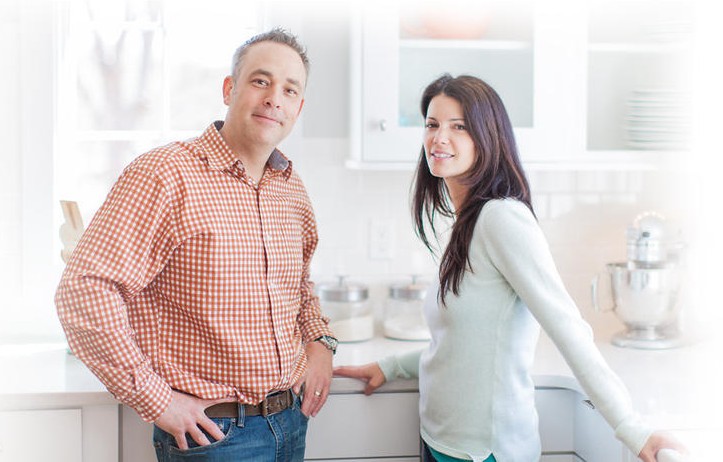NATURAL WOMANHOOD EXCLUSIVE
How a husband and wife who experienced infertility created a breakthrough method of providing emotional support for couples—and proved that on the journey to conceive life, you can’t stop living yourself.
More than 15 years ago, Marc Sherman and his wife Erin began trying to grow their family. But after four years of trying and still not getting pregnant, they felt what so many couples today feel: something was off.
They tried everything—altering their lifestyle, considering treatments—but nothing seemed to work. “We were really being pushed to IVF as many people are,” Sherman told me in a phone interview. “It was the logical thing to do next, but my wife and I decided not to pursue that path.
Physically, emotionally, spiritually, it was not in line with what we believed in.”
When the Shermans decided against IVF it seemed they had reached the end of their options. They gave up. They traded in their car for a jeep and bought a 35-foot boat. They decided if life wasn’t going to give them what they wanted, they’d at least enjoy what they had. As Marc put it, they “made up for a lot of lost time.”
Then, one day, Erin was feeling ill. She was pregnant!
We’ve all heard these stories: couples who have tried forever finally stop trying, or decide to to adopt, and that’s when they finally conceive. Marc and Erin had heard these stories too. “They’re not helpful stories when you are struggling,” Marc told me. “They make you feel like it’s your problem. They make you feel like you are doing something wrong and contributing to the problem. Then it happened to us.”
It happened to the Shermans twice, in fact.
After giving birth to their son Maxwell, Marc and Erin tried again for a second child. Again, they waited. Again, they tried to change their lifestyle to be more conducive to conceiving. Again, no baby. This time, the Shermans decided to pursue adoption. They were selected by a young couple to talk to them about their unborn child. This was a very emotional meeting, Sherman explained. “During our time together we shared with them our struggle conceiving our son Maxwell and how sometimes in life we might not understand life’s order or why something is happening (or not), however your ability to trust in a time of great uncertainty is very powerful. We shared that our struggle became of gift not only in changing the way we think about our role as parents but our overall perspective and view of life.”
The meeting was impactful for both parties. “Two weeks later my wife realizes she’s pregnant again,” Marc says. “And just days later the adoption agency informs us that the couple was so touched by our story that they decided to keep their unborn child.”
Marc and Erin were stunned. On that day, they realized it would all work out. Also that day, while Marc and Erin may not have known at the time, a journey had begun that would later grow into a quest and life passion to understand what happened to them, and how they could help other couples.
“So much of our life had been lost to the struggle of trying to overcome [infertility],” Marc told me. As the years passed, he couldn’t help but try to make sense of how they conceived. “I would just continually look; why hasn’t there been more research? As a society we grow and evolve based on shared experiences… I couldn’t understand why we wouldn’t push to understand more about these stories in an effort to help others.” Ultimately, Marc says, it became “a blessing and an opportunity that no one’s looked at this.” Feeling unfulfilled in a corporate job at the time, he decided to take a leap of faith and walk away from everything he had to conduct this unique research and find answers that could empower couples.
Marc and Erin partnered with Dr. Kate Webster. Dr. Webster has a PhD in experimental psychology and multivariate statistics. Marc asked Dr. Webster if she would be interested in helping to conduct research into all variations of why couples conceive after “giving up.” She was in. Webster knew to investigate this could help countless couples and bring them hope.
Marc and Dr. Webster began their mission “to understand, at the very core, the sorrows and joys and scientifically map the similarities among them. This mapping can enable us to pinpoint moments of transition and triggers, allowing those on their journey to understand when it’s time to alter their course, leading to an acceptance of oneself, of their partners and one’s situation.” Organic conceptions was born.
The Shermans and Dr. Webster hired a third party company to conduct interviews with couples to avoid bias. It took a lot of time and effort to do the research, and they understood that there might not be a common thread. But they ultimately learned that what so many of us have heard anecdotally was scientifically significant as well. “Story after story would map to one of these nine transitions. We realized very quickly that we have something very meaningful.” After more than 100 interviews, Dr. Webster noticed “it’s all repetitive.” There are common narratives and this is conclusive enough for qualitative research.
WHEN WE STOPPED LIVING
If you’re a person who has struggled trying to conceive, you know how much it affects your day to day life. There’s the emotional grief of being infertile that’s hard to live with, and for many couples, there’s also the hardship of going through all range of treatment options to try to find a solution.
Marc and Erin had been there. They knew too well how emotional health can get pushed to the side when trying to conceive. “I wish someone told us that my wife and I, that we mattered, as individuals and as a couple. My wife and I gave up our sushi night; because we heard raw fish could hurt our chances of conceiving. There’s probably a hundred little give ups, infinite small decisions you make with end goal of conception. You essentially give up living, because you’re living to try.”
It turns out, taking time to identify one’s thinking patterns can be hugely helpful for couples, not only to get out of painful cycles of thought, but also makes them more likely to conceive. That’s why Marc took the research conducted with Dr. Webster’s help and created a program couples can go through in the comfort of their homes, listening to the online audio modules, following a workbook, and journaling their thoughts and feelings. The program is designed to optimize a couple’s emotional health and wellbeing for conception.
“We are more than just our biology,” Sherman states. “We must make room for the emotional and spiritual elements of this journey. We think this program will allow couples the space to transform, to open themselves to where this process might take them, to pay more attention to their emotional health, wellbeing, and unity as a couple. We’re not promising an outcome, but we’re helping bring couples to a place of peace and trust while living with the incredible uncertainty that comes when trying to conceive.”
It turns out, that path is often a fruitful one.
“A lot of women feel their body is failing them, that it’s their fault, that their clock is ticking. In absorbing those thoughts they can take on so much of the burden and become very isolated in the process. Many women we’ve spoken to tell us, ‘I never knew how much resentment I was carrying—to the doctors, to my husband, to my family, to the world.’ This woman is carrying this burden, this anger; and she doesn’t even realize it until she stopped.” One doctor told Sherman it reminded him of the stages of grief, and there’s an empowering element to realizing they’re participating in a common process—that they aren’t alone. Organic Conceptions normalizes the infertile woman’s experiences and validates her powerful emotions; she becomes equipped to know that what she’s going through has been shared by others.
“Only then can you start to empower a couple to start to think differently about themselves, their bodies, and really their relationship with the journey,” Marc told me. “Because for so many there’s a lot of resentment and anger, and if we can shift that, we can make room for healing.”
What Erin and Marc have found with Organic Conceptions is that, for many couples, their “delay in conception” became a gift. So many couples found their way to adoption or foster care, others used the time to strengthen and grow in their marriage, or spend time with children already in their lives, while others used the time to find greater clarity in their life’s purpose. Regardless of the path they pursued, all participants referred to their struggle as preparation for not just parenthood but beyond.
The Organic Conceptions program is organized into 1-hour audio increments, to be listened to by the couple over an 8-week period. Over the course of that time, they are afforded the space to connect as husband and wife in a way they may not have been able to for some time. “There can be some bad days, bad weeks, bad months in a couple’s journey. The program provides the tools and strategies to catch ourselves as we go down these thinking streams that can be unhelpful.”
One anonymous user of Organic Conceptions described her experience thus: “Over the past 11 months, I have found it easy to get consumed by my own problems, fears, and worries with my fertility, and this program helped me to look at the big picture. It helped me to remember that the more power I give to those negative feelings, the less I’m giving to my own healing and self-worth. . . . I think others would find this just as beneficial, if for nothing else than a small voice reminding you that truly, your fertility struggles aren’t bigger than life itself and are most definitely capable of healing.”
Since starting Organic Conceptions, Marc says he’s heard a lot of positive feedback from husbands as well. “What a woman is feeling is far different from what a husband is feeling; neither is right or wrong, but to validate each other can be powerful.” Often, when wives grieving from months of infertility, husbands try to stay positive, but Marc says, “that’s not validating the concern she might feel, and then it can grow into a separating influence. If there’s one thing that should be at the center of the journey to parenthood, it is the relationship of the couple.” The program is designed to help bridge the gap in communication and empower couples with the tools that can reunite them during this time of tremendous stress and uncertainty.
The Organic Conceptions program is not a replacement for professional therapy, but a lot of couples don’t want to add another doctor’s appointment, another regimen, another meeting, or another cost. This is why Marc and Erin formulated something that can work in the privacy of couples’ homes.
Now, NaProTechnology doctors and FertilityCare practitioners are starting to incorporate Organic Conceptions in their practices to help couples grow in understanding their bodies to get closer to natural conception if possible. NaPro offers insight into the health of a woman’s fertility cycle, and Organic Conceptions offers insight into the health of her thoughts and feelings. “Many doctors are rolling our program into their total care, looking at the whole person,” Sherman says. “The combination of NaPro Technology and our program is a perfect marriage!”
One such practitioner, Monica Bergeron, CFCP at Icon FertilityCare Center, shared that after a client of hers completed the audio program, “I noticed that she was visibly different. Her demeanor had changed from one of anxiety and desperation to one of peace and optimism. She said she had gained valuable life skills from the experience and was now able to both recognize and reframe her anxiety.”
It’s just one contribution among all the offerings for couples facing infertility today, but Sherman thinks it’s much needed. “Infertility is one of the most vulnerable times of a person’s life, and it’s so easy to search online and find countless IVF clinics offering services as easily accessible as financing a car. “The Google search data is crazy,” Marc says. “You have no ideas how many people are searching and trying to conceive; when someone’s in a very vulnerable spot, and they see hope, they go, they make the call.”
“As we work together with NaPro,” Marc says, “we become a robust logical first step for couples experiencing infertility. Why not learn your body and understand your body and get to the root cause of the problem? Why not get emotionally healthy and stable and try this? . . . It’s amazing the results we are seeing.”
While Organic Conceptions cannot promise conception to users of the program, together with fertility awareness methods and Naprotechnology, it may offer the best natural shot. And, by offering a service that helps husbands and wives find where they fit in the statistically common pitfalls of the journey, get out of unhealthy thought cycles, and get back to living life, there’s no doubt Organic Conceptions brings couples closer together in an otherwise scary and divisive time. That’s a service of immense value that, no one could disagree, all couples facing fertility challenges should have.
—
This post was sponsored by Organic Conceptions. Are you interested in learning more about Organic Conceptions?
CLICK HERE IF YOU ARE A COUPLE INTERESTED IN LEARNING MORE
CLICK HERE IF YOU ARE A PROFESSIONAL SERVING COUPLES STRUGGLING WITH FERTILTY







